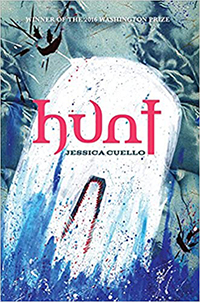Verdad Magazine Volume 30
Spring 2021, Volume 30
Hunt by Jessica Cuello
The Word Works, 2016 winner of the Washington PrizeReview by Bill Neumire
Herman Melville’s Moby Dick tells a story of men attempting to assert dominance over the natural world by hunting and harpooning whales--ostensibly for food and livelihood, but, as Ahab’s maniacal pursuit of the white whale Moby Dick illustrates, truly for a delusion of power and control. In her book, Hunt, Jessica Cuello re-bestows the story to readers from the persona of the female, and of the whales and the sea. Cuello, whose poetry has won the Barrow Street Prize, the CNY Book Award, and the Washington Prize in the past five years alone, inserts this erased voice immediately, not only via the whale, but hinting to us that even “the waves are women.” Structurally, each poem in the book is a response to a specific chapter in Moby Dick, moving along in sequence (though not all chapters are addressed). The men of this collection are violent, cruel, all-consuming beings made legend in horrifying moments of warning:
My mother told me that in the real world
one man carved rape onto
his victim’s back.
Before I knew what real was.
These pages are populated with men who “resent” any “cross-purposes. / Her purposes at all.” They are men who live by the motto “Possession is the law,” an edict made mantra in ‘Rules for Being Captured, Rules for Being Owned.’ Which all begs the question “How am I wild and he is not?” and the whale’s answer returns, "Yes, I eat and tear / life unto life. Food unto food. / You are different: kill and sell." There is more than a facile antagonism at hand, here, as the speaker extends pitying lines like, "[w]hat you've done / to me you've done to you," and "I thought how sad men were / stepping with legs / into their pants." Perhaps the history of this gendered conflict is most woundingly put here, in ‘The Fountain: How the Whale Hides’:
once, I approached
once, curious
once, open like a lily
once, before you ruined
everything:we’re all tired
of your marauding
The shift in perception is the most notable device in these poems, as the speaker addresses her hunters, the reader, and even herself. Her sense of perceiving and being perceived is constantly at hand, admitting she “always wanted a picture of [her]self.” That picture, though, such a simple and significant act of attention, can’t be had in this land of violence and survival: "What of how you saw me? / Great gulf. Blank, blank. / What inattentiveness is hate." This results in a search for identity that moves beyond flesh, beyond huntable meat, a primary structural movement of the book that comes in tidal waves in moments such as “[t]he paint was a lie / but the act of painting was real," and "[w]here did / I forget that I was I."
The female versus the male dichotomy is both violently antagonistic--
All this time, you’ve gazed
into the sea at yourselflike you’re trying on my broken jaw
but I am fighting for my life
and yet ironically broken down in a transcendently deconstructionist style:
I left my body and entered their eyes
and looked back at my flank
and looked back at the places
where the tools would probe,the outline, the nipples for feeding,
the endometrium absorbed.
The splitting apart of the self is an act of both coping survival and eventual apotheosis, as the speaker eventually tells us, “I am two parts. // My body over there.” On page 50 of Hunt, there’s a poem called ‘The Whale as Object of Desire’ and then the last poem is called ‘The Whale Is No Longer an Object of Desire,’ a shorthand for the metamorphosis through these pages: this movement from objectification and property to the speaker’s transition out of herself as fleshly into a valued identity and perspective, from hunted and oppressed to free and unbound, from fear to pity for these men “[s]ad with power.” In the end, Hunt is a reclaiming of a one-sided story, yes, but is perhaps even more powerfully, a finding of the speaker’s “self past the self.”
About Jessica Cuello
Jessica Cuello’s manuscript, Liar, has been selected by Dorianne Laux for the 2020 Barrow Street Book Prize, forthcoming in October 2021. She is also the author of Pricking (Tiger Bark Press 2016), winner of the 2017 CNY Book Award, and Hunt (The Word Works 2017), winner of the 2016 Washington Prize. In addition, Cuello has published three chapbooks: My Father’s Bargain (2015), By Fire (2013), and Curie (2011). Cuello was the recipient of The 2018 New Ohio Review Poetry Prize, The 2013 New Letters Poetry Prize, and a 2015 Saltonstall Writing Fellowship. In 2014 she was awarded The Decker Award from Hollins University for outstanding secondary teaching. She teaches French in Central NY and is a poetry editor for Tahoma Literary Review.
Hunt by Jessica Cuello
published by Word Works; (March 15, 2017)
ISBN-10 : 1944585079
ISBN-13 : 978-1944585075

